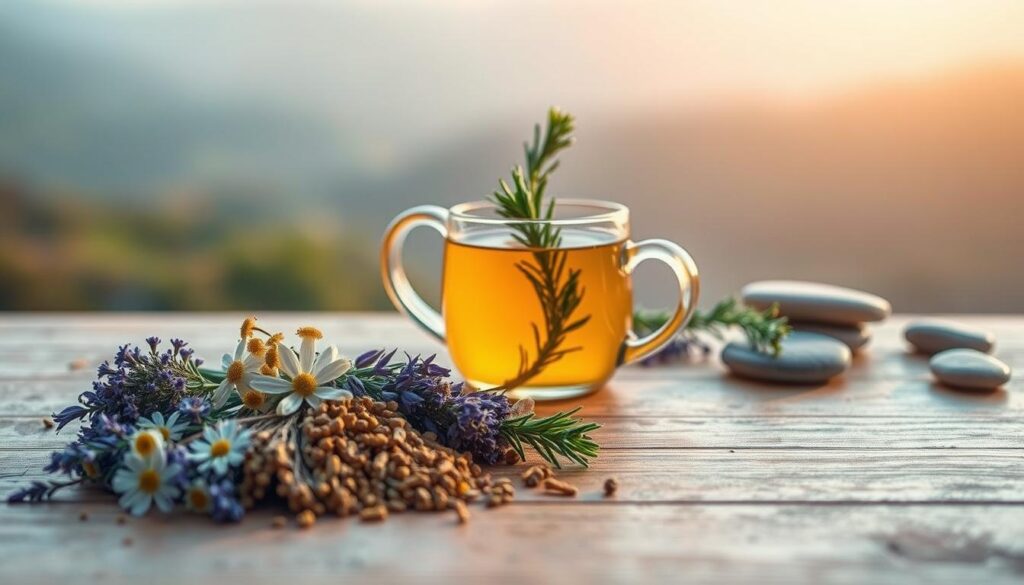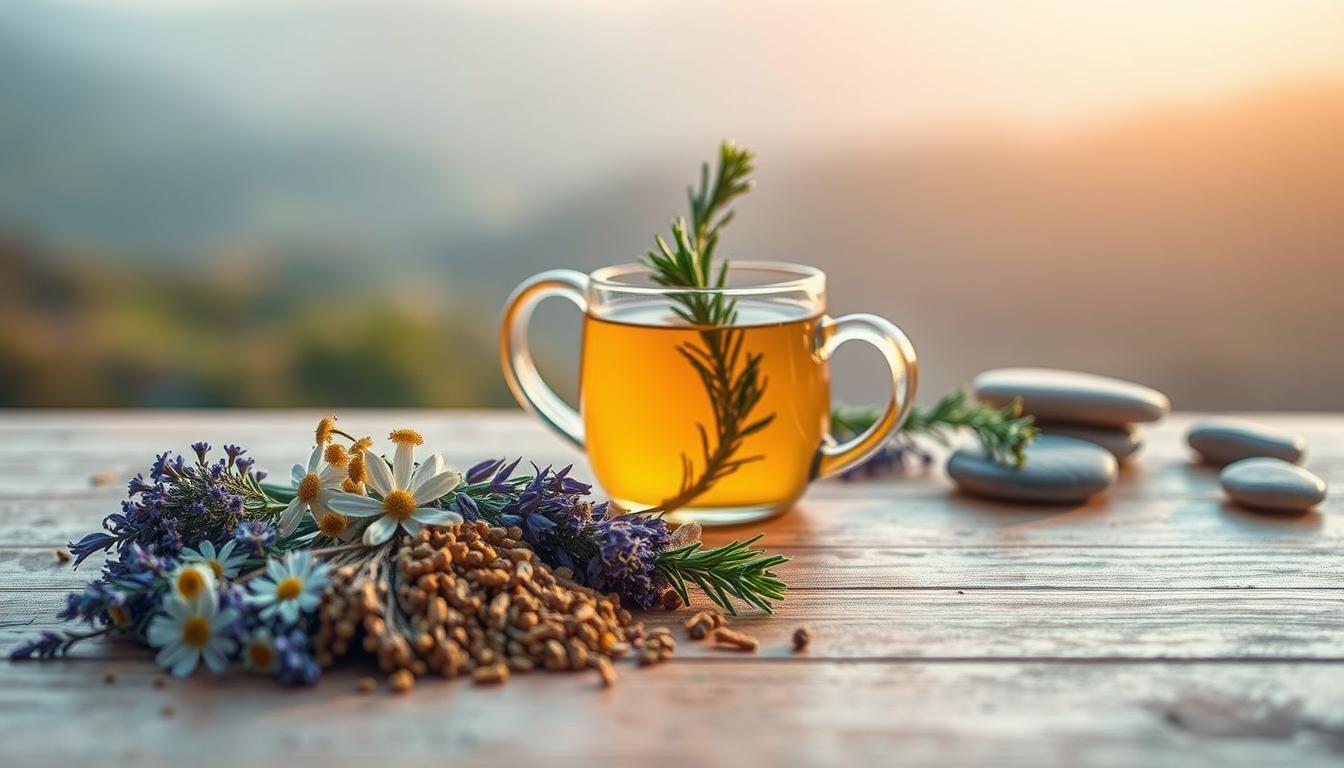Natural Herbs: How to Use Them for Better Sleep
Table of Contents
Are you having trouble sleeping? You’re not alone. Millions of people struggle to get a good night’s rest. Natural herbs can help you find peace and balance your body’s rhythm.
Herbal remedies have been around for centuries. They are a kinder way to help you relax and sleep better. Herbs like valerian root and chamomile can calm your mind and body for a good night’s sleep.
Looking into natural herbal remedies can be a game-changer. With 33% of adults facing sleep issues, these herbs might be the answer you’ve been searching for.
Key Takeaways
- Natural herbs offer a holistic approach to improving sleep quality
- Botanical medicine provides gentler alternatives to prescription sleep medications
- Various herbs target different aspects of sleep regulation
- Herbal remedies can address underlying causes of sleep disruption
- Many natural herbs have minimal side effects compared to traditional sleep aids
To get better results, you can benefit from the benefits of this nutritional supplement
Understanding Sleep Disorders and Natural Remedies
Sleep is key to your health, but millions of adults face sleep disorders. These issues can greatly affect their lives. About 15% of people deal with chronic insomnia, which can harm their health over time.
Many factors can cause sleep problems, like stress and lifestyle choices. People are turning to natural remedies. They use medicinal plants and plant-based therapies to help.
Common Sleep Issues Affecting Adults
Adults often face different sleep disorders:
- Insomnia (difficulty falling or staying asleep)
- Sleep apnea (interrupted breathing during sleep)
- Restless leg syndrome
- Chronic nighttime wakefulness
Why Natural Solutions Matter
Traditional sleep meds can have bad side effects. Natural remedies are a softer way to tackle sleep issues. They use medicinal plants and holistic healing to help you sleep better, without the risks of drugs.
The Science Behind Sleep Regulation
Sleep is controlled by neurotransmitters and hormones. Melatonin is a key hormone for sleep. Studies show melatonin levels peak before bedtime, helping your body know it’s time to sleep.
Understanding your body’s natural sleep mechanisms is the first step toward developing effective, holistic sleep strategies.
The Role of Natural Herbs in Sleep Improvement
Exploring alternative medicine shows us strong natural supplements that can change how we sleep. Organic herbs are a soft way to tackle sleep issues without the bad side effects of drugs.
Your body’s sleep cycle is complex, and natural herbs can help a lot. These plants work in many ways to help you relax and feel less anxious:
- Promoting nervous system calm
- Regulating stress hormones
- Supporting natural sleep rhythms
Adaptogenic herbs are especially good for sleep. Adaptogens help your body manage stress, making it easier to sleep well. Plants like Ashwagandha and Rhodiola can cut stress levels by up to 28%.
When picking natural supplements, choose high-quality, organic herbs. Whole plant extracts give more benefits than isolated compounds. This way, you get all the good stuff from the plant.
Nature provides powerful healing tools when we understand how to use them wisely.
About 70% of adults have sleep problems, making natural options more appealing. By using organic herbs and alternative medicine, you help your body sleep better without the risks of drugs.
Melatonin and Sleep Regulation
Understanding melatonin’s role is key to managing sleep. This hormone regulates your body’s internal clock and supports healthy sleep cycles. As a part of botanical medicine, melatonin helps keep your sleep-wake rhythm in sync.

How Melatonin Works in Your Body
Melatonin is made by the pineal gland in your brain. It starts when it gets dark, telling your body it’s time to sleep. As natural herbs interact with your sleep cycle, melatonin helps:
- Regulate circadian rhythms
- Reduce time needed to fall asleep
- Improve overall sleep quality
Natural vs Synthetic Melatonin Sources
While synthetic supplements are common, natural herbs can also boost melatonin. Here are some natural sources:
| Natural Source | Melatonin Content |
|---|---|
| Tart Cherries | High Concentration |
| Walnuts | Moderate Content |
| Milk | Low Concentration |
Proper Dosage and Timing
For the best results with melatonin supplements, follow these tips:
- Start with low doses (1-3 mg)
- Take 30 minutes before bedtime
- Avoid exceeding 10 mg per 24-hour period
Pro tip: Consult your healthcare provider to determine the right dosage for your specific sleep needs.
Valerian Root: The Traditional Sleep Aid

Valerian root is a strong medicinal plant in holistic healing. It has been used for sleep wellness since ancient Greece. It’s a natural way to tackle sleep problems.
Valerian root’s power comes from its special chemicals. Studies show it might lower anxiety without the usual side effects of drugs. It also boosts GABA, helping you sleep better and faster.
“Valerian root has been a trusted natural remedy since the 1500s, supporting individuals seeking alternative sleep solutions.”
Here are key benefits of valerian root for sleep improvement:
- Falls asleep faster within 3 days of daily use
- Improves overall sleep quality
- Supports longer sleep duration
- Potentially increases deep sleep time
When considering valerian root supplements, keep these important points in mind:
- Typical dosage is 200 mg daily
- Take one hour before bedtime
- Consult healthcare providers for personalized advice
- Be aware of potential side effects like dizziness
Note: Valerian root is regulated as a dietary supplement in the United States and is not classified as a drug.
Chamomile and Its Calming Properties
Chamomile is a key natural supplement in alternative medicine. It offers great relaxation benefits. Every day, over 1 million cups of chamomile tea are enjoyed. This shows how popular it is for helping people sleep better and feel less anxious.
This herb has over 120 chemical compounds that help it work well. It has 28 terpenoids, 36 flavonoids, and more. These help keep us healthy and well.
Different Forms of Chamomile
Chamomile is available in many forms, each with its own benefits:
- Tea: The most common way to enjoy it, with 1-4 cups a day
- Capsules: You can take 1-2 capsules (up to 1000 mg) at a time
- Tinctures: These are strong liquid extracts
- Essential oils: Great for skin care and aromatherapy
Preparation Methods for Maximum Benefits
To get the most out of chamomile, follow these tips:
- Steep your tea for 5-10 minutes to get the best benefits
- Drink it 30-45 minutes before bed
- Use filtered or spring water for the best taste
- Opt for organic herbs for the purest quality
Combining with Other Herbs
Chamomile pairs well with other herbs like valerian root and lavender. Together, they can improve sleep and relaxation. Always talk to a healthcare expert before mixing herbs to make sure it’s safe and works well.
Chamomile’s apigenin compound works like a mild tranquilizer. It helps regulate sleep naturally.
Natural Herbs and Their Active Compounds
Botanical medicine opens a world of complex chemical interactions in natural herbs. Each plant has unique active compounds that work together to help with sleep and wellness. Knowing how these compounds interact can help you use herbal remedies better.
The entourage effect is key in herbal medicine. It shows how different compounds in one herb can create stronger benefits than each one alone. Natural herbs have many molecules that help your body sleep better.
- Triterpenoid saponins in Bacopa monnieri boost brain function
- Rosmarinic acid in herbs like lemon balm helps calm you down
- Flavonoids in chamomile make it a good sedative
Some herbal compounds are really good for sleep. For example, a 2023 review found that Bacopa monnieri’s saponins help with word recall and learning. Also, a 12-week study showed ashwagandha root extract improved sleep and alertness in older adults.
When looking at herbal remedies, it’s important to know each herb has its own set of active compounds. These ingredients interact with your body’s systems, offering gentle yet effective support for sleep.
Safe Usage Guidelines and Potential Interactions
Exploring medicinal plants and plant-based therapies needs careful thought. Natural remedies can heal holistically, but knowing how to use them safely is key.
Herbal supplements require knowledge and caution. Different herbs can affect medications in ways you might not expect, which could harm your health.
Critical Drug Interactions to Watch
Some medicinal plants can greatly interact with common medicines. Important interactions include:
- Ginseng can affect calcium channel blockers and blood pressure drugs
- St. John’s Wort might make oral contraceptives less effective
- Ginkgo biloba could increase bleeding risks with warfarin
- Chamomile might interact with certain prescription drugs
Recommended Dosage Guidelines
Getting the dosage right is vital in holistic healing. Always start with the lowest dose and watch how your body reacts.
“Natural doesn’t always mean safe. Consult professionals before starting any herbal regimen.” – Herbal Medicine Expert
When to Seek Professional Advice
It’s important to talk to healthcare providers in these cases:
- You’re on multiple medications
- You have health issues
- You’re pregnant or breastfeeding
- You’re planning surgery
Remember: Your health and safety should always be the top priority when exploring plant-based therapies.
Creating an Effective Herbal Sleep Routine
Creating a sleep routine with natural supplements needs careful planning and regular practice. Alternative medicine has strong organic herbs that can change your sleep for the better. About one in three adults have trouble sleeping, so a well-planned approach is key for good nights.
Your herbal sleep routine should include several steps to work best:
- Choose high-quality organic herbs that help with sleep
- Make a consistent evening routine for relaxation
- Know the right amount and when to take natural supplements
- Watch how your body reacts to different herbal mixes
When setting up your routine, keep these tips in mind for using natural supplements:
- Start with small amounts of sleep-helping herbs like valerian root or chamomile
- Keep track of how well you sleep and adjust your supplements as needed
- Use herbs that work well together to help you sleep
Good sleep habits are important when using alternative medicine. Stick to a regular sleep schedule, avoid screens before bed, and make your bedroom a calm place. Experts say adults should sleep 7-9 hours a night, and natural supplements can help you get there.
Remember, patience is key when exploring natural sleep solutions. Your body needs time to adjust to new herbal routines.
Always talk to a healthcare professional before starting any new supplement, especially if you have health issues or take medicines.
Conclusion: Embracing Natural Solutions for Better Sleep
Sleep problems affect millions in the U.S., with about 30% of adults facing chronic sleep issues. Natural herbs and botanical medicine are promising alternatives for better sleep. They offer a way to improve sleep quality without just using drugs.
Exploring herbal remedies can help you find better sleep. Valerian root, for example, has an 80% success rate in improving sleep. These natural solutions work well with lifestyle changes to help you sleep better.
When looking into natural sleep aids, getting advice from a doctor is key. They can guide you on safe herbal choices and ensure they fit your health needs. The global sleep aids market, worth $78.9 billion in 2022, shows more people want natural sleep solutions.
Adding botanical medicine to your sleep routine needs time, research, and a doctor’s advice. By knowing your body’s needs and trying natural herbs, you can find a balanced way to sleep well.
FAQ
Are natural herbs safe for improving sleep?
Many herbal remedies can help with sleep, but talk to a doctor first. They can affect how medicines work and might cause side effects. Choose organic herbs from trusted sources and start with small amounts to see how you react.
How quickly can I expect results from herbal sleep aids?
Herbal remedies need time and patience. They work differently than medicines and might take weeks to show results. Most people see better sleep in 2-4 weeks of regular use.
Can I combine different herbal sleep remedies?
Some herbs can be mixed for better sleep, like chamomile with valerian root. But, check for possible interactions first. A healthcare provider can help with the right mix.
Are there any herbs that should be avoided if I’m taking other medications?
Yes, some herbs can react with medicines. Valerian root, for example, might not mix well with certain drugs. Always tell your doctor about all your medicines before trying herbal supplements.
How do I know which herbal remedy is best for my specific sleep issue?
Different herbs help with different sleep problems. Chamomile or lavender might help with anxiety, while valerian root or passionflower can help you fall asleep. Talk to a healthcare provider or herbalist to find the right one for you.
Are herbal sleep aids safe for long-term use?
Using herbal remedies long-term needs careful watching. While safe for many, they can cause side effects or lose effectiveness over time. It’s better to use them occasionally and focus on good sleep habits and stress management.
Can children or pregnant women use herbal sleep remedies?
Most herbal sleep aids are not safe for kids or pregnant women without a doctor’s okay. Some herbs can be harmful. Always check with a pediatrician or obstetrician before using herbal supplements in these groups.
What’s the difference between organic and non-organic herbs?
Organic herbs are grown without harmful chemicals, making them safer and more effective. They are better for you and often more potent. Choose certified organic herbs from trusted brands for the best quality.
How should I store herbal sleep supplements?
Keep herbal supplements in a cool, dry place away from sunlight. Heat, moisture, and light can damage them. Use airtight containers and follow the storage tips from the manufacturer to keep them effective.
Can herbal sleep aids help with chronic insomnia?
Herbal remedies can be helpful, but chronic insomnia needs a full plan. Herbs can support, but you also need to improve sleep habits, manage stress, and possibly see a doctor.







